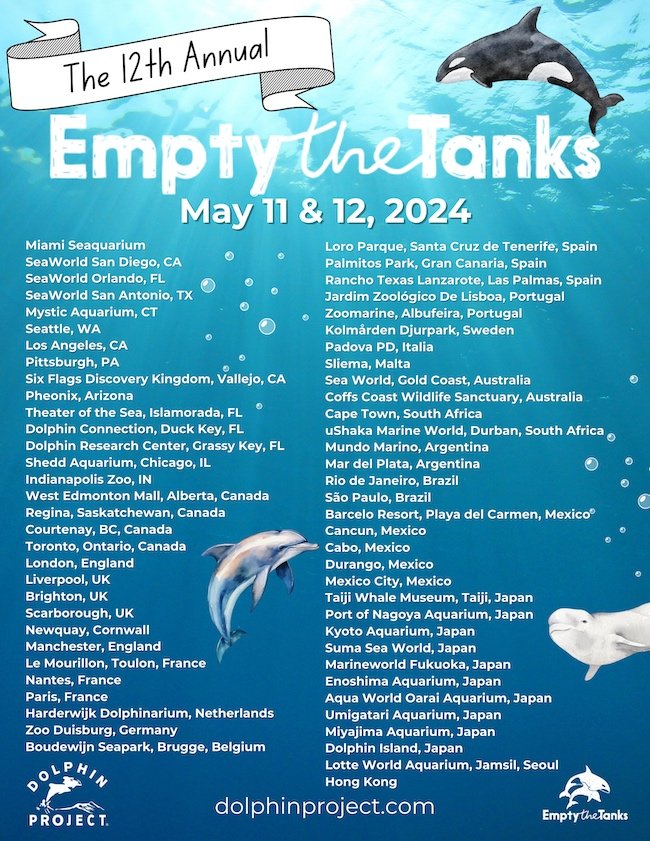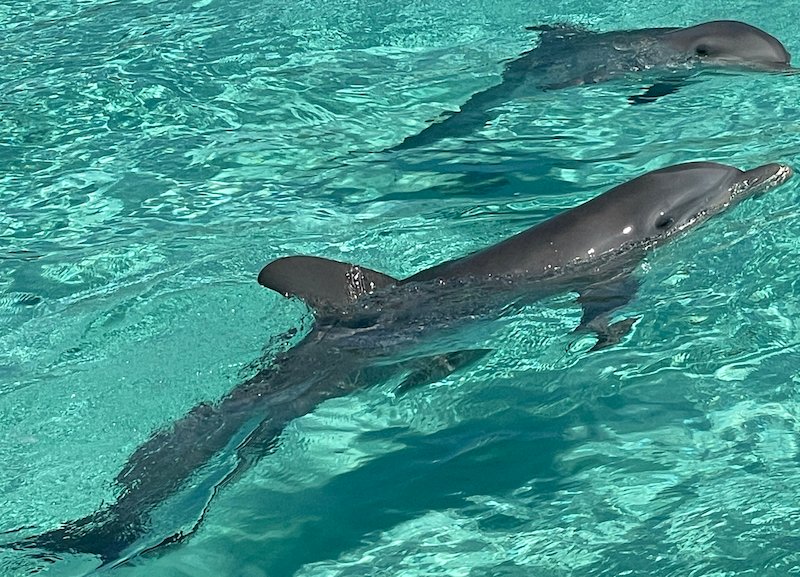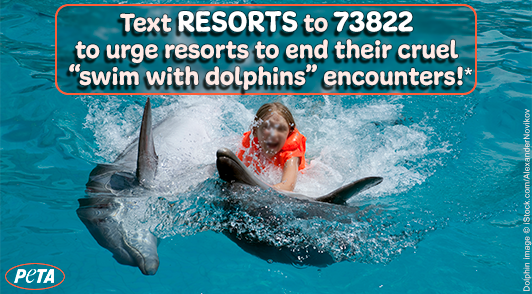Over the past 12 years, the Empty The Tanks event has evolved from a local initiative into a powerful global movement, uniting advocates from all corners of the world in a common cause: standing up for the rights and welfare of dolphins and whales. With 64 events held across 20 countries, Empty The Tanks has become a beacon of hope and solidarity for these intelligent and sentient beings held in captivity.

At Empty The Tanks events, participants peacefully gather in front of their local aquariums or marine parks to protest the confinement and exploitation of dolphins and whales for entertainment purposes. Through demonstrations, educational outreach, and public awareness campaigns, advocates raise their voices in support of ending captivity and advocating for the protection of marine life in their natural habitats.
This year, on May 11 and 12, individuals worldwide are invited to join the Empty The Tanks movement by participating in an event near them. Whether you’re a seasoned activist or new to animal advocacy, Empty The Tanks offers an opportunity to make a meaningful impact and be a voice for dolphins and whales.
By participating in an Empty The Tanks event, you can show your solidarity with these magnificent creatures and send a powerful message to aquariums and marine parks that the public demands an end to captivity and exploitation. Together, we can work towards a future where dolphins and whales are free to live their lives in the wild, where they belong.
In the desolate setting of an abandoned marine park at Blackbeard Cay, also known as Balmoral Island, Nassau, Bahamas, a distressing scene unfolds as eight dolphins have perished, leaving behind five emaciated and neglected survivors.
The Dolphin Project received distressing reports concerning an inactive captive dolphin facility on Balmoral Island. Following its closure during the COVID pandemic, the tourist attraction failed to resume operations, leaving the dolphins in a state of neglect and uncertainty.

Upon receiving an invitation from the sole caretaker and dolphin trainer, Luis Arturo Hernandez, Dolphin Project’s Founder/Director, Ric O’Barry, embarked on an inspection of the dolphins and the abandoned facility. His firsthand observations, many of which were corroborated by Hernandez, revealed conditions tantamount to animal abuse, likely contributing to the alarming number of dolphin fatalities.
These conditions include:
- Absence of electricity or running water on the premises, with a malfunctioning generator exacerbating the situation.
- Inadequate facilities for storing and preparing the dolphins’ food, resulting in malnutrition and dehydration.
- Depleted stocks of essential medications for the dolphins, with many expired or empty.
- Severely underweight dolphins, indicative of chronic malnutrition and dehydration exacerbated by the absence of proper care and nourishment.
- Deteriorated infrastructure, including breached fences in the sea pens and unsanitary conditions, posing further risks to the dolphins’ well-being.
- Insufficient staffing and absence of veterinary care or security measures.
- Lack of enrichment and shade in the dolphins’ enclosure, compounded by shallow water levels and exposure to adverse weather conditions.
During the visit, Mr. Hernandez consulted a veterinarian in Mexico, Dr. Jose Luis Solorzano, who disclosed reducing the dolphins’ food intake by 50% due to warmer weather. However, the observed conditions suggest even more severe deprivation. Dolphin Project cannot ascertain Dr. Solorzano’s authorization to practice veterinary medicine in the Bahamas.
In 2013, eight captive dolphins were imported from Honduras for a proposed swim-with-dolphins attraction. Despite a legal challenge by environmental activist Sam Duncombe and her Bahamian environmental organization reEarth, the dolphins remained at the site. The subsequent birth of five offspring increased the total to 13 dolphins, with eight deaths occurring since 2018, including five in 2023, with starvation implicated in at least three cases.
Current Situation: Given the dire circumstances on Balmoral Island, Dolphin Project urges the Bahamian government to implement urgent interventions for the remaining dolphins, including:
- Immediate medical evaluation and treatment by an independent veterinarian, alongside nutritional and hydration support.
- Augmented staffing with trained personnel and site improvements, facilitated by external assistance.
- Provision of shade and protection from boat traffic, essential for the dolphins’ well-being.
- Introduction of enrichment activities to alleviate distress and enhance their quality of life.
On April 10, Duncombe met with the Minister of Agriculture and Marine Resources, The Honorable Jomo Campbell, to discuss the dolphins’ plight and Dolphin Project’s offer to provide assistance. Although initially receptive, subsequent attempts to follow up were met with silence from the government.

The neglect and deprivation endured by the dolphins on Balmoral Island constitute egregious violations of Bahamian animal welfare laws, necessitating urgent intervention to ensure their protection and well-being.
A transformative opportunity exists for the Bahamas to establish the first dolphin sanctuary/retirement facility in the Americas, aligning with evolving global sentiments against dolphin captivity and exploitation. Dolphin Project, drawing on over 54 years of experience, stands ready to support such initiatives, building on its track record of dolphin rescue and rehabilitation worldwide.
Travel Company TUI Urged to Halt Support for Orca and Dolphin Abuse. The harrowing reality of orcas and dolphins confined within the confines of SeaWorld’s concrete tanks has long been a subject of global concern. These majestic marine mammals, renowned for their intelligence and social complexity, are subjected to a life of deprivation and suffering, devoid of the physical, mental, and emotional stimulation essential for their well-being. Despite mounting condemnation of SeaWorld’s cruel treatment of animals, travel company TUI—formerly known as Thomson Holidays—continues to sell tickets to the amusement park, perpetuating the cycle of abuse and exploitation.

At SeaWorld, orcas endure the torment of confinement in cramped tanks, where they are forced to swim in endless circles, deprived of the vastness and complexity of their natural ocean habitat. Tragically, more than 40 orcas have perished at SeaWorld, many falling short of their natural life expectancies, succumbing to causes ranging from bacterial infections to fractured skulls. The toll of suffering extends beyond orcas, with hundreds of other dolphins, whales, and animals meeting untimely deaths within the park’s confines.
The plight of dolphins at SeaWorld is equally dire, with incompatible groups of these intelligent marine mammals crammed into overcrowded tanks. Over 100 dolphins are confined within just seven tanks, rendering them vulnerable to attacks from frustrated and aggressive peers. The consequences of captivity are profound, robbing these animals of their natural behaviors, social interactions, and freedom of movement.
In response to mounting public outcry, musician and activist Morrissey has joined the chorus of voices urging TUI to sever ties with SeaWorld. Drawing on his involvement with PETA U.K.’s successful campaign that prompted Jet2holidays to cut ties with cruel marine parks, Morrissey has penned a letter to TUI’s leadership, calling on the company to follow the example set by dozens of other businesses—including Booking.com, Tripadvisor, and Virgin Holidays—that have severed ties with the abusement park.
The call to action is clear: TUI must heed the moral imperative to end its support for the abuse and exploitation of orcas, dolphins, and other marine mammals at SeaWorld. By dissociating from SeaWorld and refusing to sell tickets to the park, TUI can align itself with ethical values and demonstrate its commitment to animal welfare and conservation. As travelers, consumers, and advocates for change, we have the power to hold companies like TUI accountable and demand an end to the suffering endured by marine mammals in captivity.
Dear Hawks Cay Resort, The Kahala Hotel & Resort, and Hilton Waikoloa Village,
I am writing to express my deep concern regarding your offering of “swim with dolphins” encounters at your respective establishments. While these encounters may seem like harmless entertainment, the reality is that they perpetuate the exploitation and suffering of dolphins for human amusement.
Dolphins are highly intelligent and social animals that belong in the wild, not confined to tanks or forced to interact with tourists. The captive dolphin industry perpetuates cruelty by breeding dolphins in captivity or capturing them from their natural habitats, disrupting their social structures and subjecting them to a life of confinement and stress.
I urge you to reconsider your decision to offer “swim with dolphins” encounters and to take immediate action to end these exploitative practices at your resorts. Furthermore, I implore you not to permit the breeding or acquisition of more animals on your premises. Doing so only contributes to the cycle of cruelty and exploitation.
Instead, I encourage you to promote responsible tourism that respects the rights and well-being of all living beings. There are many alternative activities and experiences that you can offer your guests that do not involve the exploitation of animals.
Please take a stand against animal cruelty and align your establishments with ethical and compassionate values. Your customers and the dolphins themselves deserve better.
Sincerely, [Your Name]
[Your Contact Information]
Remember to include PETA’s terms for automated texts/calls (http://peta.vg/txt) at the end of your message and provide options for recipients to opt-out if they wish. Together, we can make a difference for dolphins and end their exploitation for human entertainment.
Contact them on social media:
Hawks Cay Resort: INSTAGRAM – FACEBOOK – X


